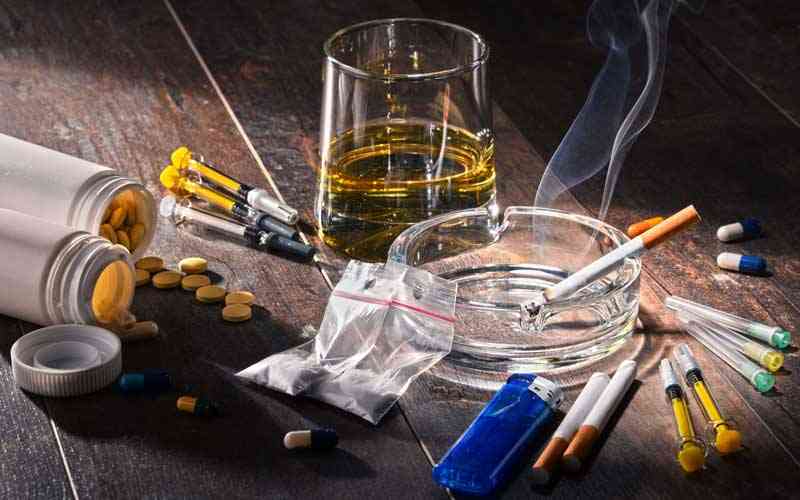
Mental health is a state of well-being in which an individual realises his or her own potential, can cope with the normal stresses of life, can work productively and fruitfully, and is able to make a meaningful contribution to their community.
Mental health is a critical component of individual, family, community and national wellbeing and prosperity.
Zimbabwe is facing an increasing threat of substance use problems particularly among, but not limited to, young people.
Alcohol and substance abuse among young people can be detrimental to their mental health with far reaching consequences.
It is critical that we understand more about substances of abuse, their impact on health and strategies to deal with this rising pandemic.
What substances are commonly abused and what impact do they have on the health of young people?
Substances or ‘drugs’ of abuse are mind altering substances that interact with our brains and bodies in such a way that it cause physical and psychological addiction.
Commonly abused substances include:
- Mavhunga puts DeMbare into Chibuku quarterfinals
- Bulls to charge into Zimbabwe gold stocks
- Ndiraya concerned as goals dry up
- Letters: How solar power is transforming African farms
Keep Reading
Alcohol: Alcohol is the most frequently abused substance worldwide. When used excessively alcohol can cause intoxication and behavioural problems, but in the long term can cause an addiction or dependence that is very difficult to overcome. Alcohol is linked to over 200 diseases, contributes to 30% of road traffic accidents and to 3 million deaths worldwide. In Zimbabwe we sadly have a culture of heavy drinking with excessive drinking being part of the social and cultural norm from birthdays to funerals. Local studies show that 40% of young people in Zimbabwe admit to regular drinking starting from as young as 12 years of age.
Cigarettes: Young people are also exposed to tobacco and cigarettes and increasingly to e-cigarettes which many young people erroneously believe are harmless. E-cigarettes and vaping are far from harmless and are now linked to lung damage (e-cigarettes and vaping product use associated lung injury).
Cannabis: Cannabis is widely abused in the community and again erroneously believed to be harmless. Early onset (particularly in young adolescence) and heavy use of cannabis have now been shown to cause challenges with motivation, drive and tenacity (amotivational syndrome), poor school performance (heavy cannabis use has been linked to decline in IQ) as well as mental health disorders (cannabis induced psychosis). Cannabis is also linked to road traffic accidents due to impairment in motor coordination and reaction time during intoxication.
Prescription drugs: Codeine-based cough syrups have been a major cause of substance-related mental health problems contributing to 20% or more of mental health admissions in Zimbabwe. Codeine- based painkillers and sleeping tablets are also commonly abused as well as misuse of medications for attention and hyperactivity problems is also a rising problem.
Stimulants: Crystal methamphetamine (‘crystal meth’) use has worryingly increased in Zimbabwe and is leading to a cascade of subsequent medical and social complications. Crystal methamphetamine is a brain stimulant but can also cause permanent neurological damage. Stimulants may also be abused in the form of diet pills because they reduce appetite and increase energy levels.
Hallucinogens and ‘party drugs’: party drugs such as ecstasy and LSD (lysergic acid diethylamide) can sadly result in long term perception problems even after stopping active use.
Does my child have a substance use problem?
Studies show that young people can use substances for up to two years before their parents or caregivers discover the use. It is critical that parents, guardians, teachers and those who work with young people educate themselves about common substances of abuse and the effects of these substances on young people.
This will help with early identification and early intervention that could help save a young life. Common signs that a young person may be struggling with a substance use problem include:
Emotional changes: substance use may result in frequent mood swings, inappropriate elated mood or unusually low mood
Behaviour changes: social withdrawal, lack of interest and motivation for school or other work, aggressive or belligerent behaviour, change of friends and associates
Physical health changes: increased or decreased energy levels, changes in sleep pattern, changes in appetite and eating habits, sudden changes in weight
How can I help my child?
Foster a relationship with your child to allow open and honest communication: As a parent or guardian, your voice can be the most significant voice in your child’s life but this requires building of an authentic, close relationship. This allows your child to come to you with their questions and not turn to peers and ‘unsafe’ adults. Studies show that young people who are closely connected to their families are less influenced by peers.
Be present, be vigilant and be a parent: There are many demands on a parent’s time but being present physically and emotionally with our children should remain a high priority. Sadly many young people are raising themselves with little or no supervision at all. Studies show that supervision of young people well into college years is protective against development of substance use problems.
Be mindful of your own mental wellbeing: Parents and guardians set a powerful influence for young people on how to cope with life. How are you dealing with stress and challenges in your life? Do you turn to alcohol and drug use to cope? Our children and young people will do as we do, not what we say.
What can we do as a society and as a nation to address substance use in young people?
Reduce substance availability and accessibility in the community: A concerted, multisectoral approach including community members, local authorities, customs authorities, law enforcement is needed to reduce supply and accessibility to substance of abuse in our communities. There is also a need enforce existing laws concerning alcohol access as well.
Reduce the demand for substances in the community and access to effective treatments: We need to raise awareness and provide correct information about the impact of substance use to the community and to young people. There is a need to promote healthy, substance free living as a lifestyle option in our society. Through intentional strengthening of the mental health system in Zimbabwe we can also improve access to effective, dignified care, treatment, recovery and rehabilitation to those who need it.
Substance use is a serious threat to the wellbeing of young people, but all of us can play our part to stem the loss of a generation to substance use. What can you do?
If you think that you or someone that you know may be struggling with an alcohol or substance use problem, please contact your nearest health care provider and get help.
- *Dr Chido Rwafa-Madzvamutse is a consultant psychiatrist.
- Feedback: Whatsapp: +263714987729)









